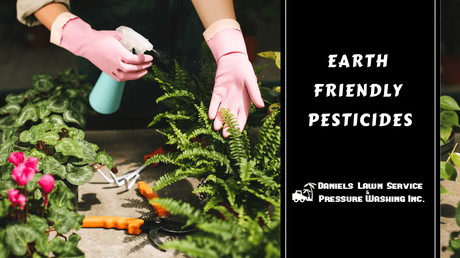
In our previous blog post, we looked at plants that act as natural repellents to mosquitoes . Mosquitoes aren't the only pests you need to worry about, though. Many insects (including whiteflies, aphids, grasshoppers, and beetles, just to name a few) are potential threats to your home's lawn and garden.
Taking care of these pests can be tricky business. Your local home and garden store may offer an overwhelming amount of pesticides to choose from. Sorting them by effectiveness alone can be difficult. It's even more difficult-and even more important-to select a pesticide that is safe. Harsh chemicals can harm your health, the health of children and pets and other beneficial insects. First, let's look at the potential dangers of these chemicals in lawn care products. Then, we'll look at some safe and Earth-friendly pesticide alternatives.
Recent Trouble with Roundup®
While our focus here is pesticides, the popular herbicide Roundup has been making headlines recently, and it serves as a cautionary tale against the widespread use of lawn care products that contain harmful chemicals.
What makes Roundup potentially dangerous is the chemical glyphosate, which takes the majority of the chemical makeup for the Roundup product line. Glyphosate was developed by the company Monsanto in 1970 , and it is now used commonly throughout the U.S. and around the world. The chemical is most often found in herbicides, but glyphosate acid and glyphosate salt compounds can also be found in pesticides . While Monsanto and the U.S. Environmental Protection Agency (EPA) claim that glyphosate-and thereby Roundup-is safe for human use when following the label directions, there are others who disagree.
Edwin Hardeman, a 70-year-old resident of California, is one of thousands of people across the country who claim that Roundup dangers include cancer . Hardeman used Roundup on his 56-acre property for about 30 years and was diagnosed with non-Hodgkin's lymphoma just three years after ending his use of the product. In 2015, the International Agency for Research on Cancer, which is part of the World Health Organization, classified glyphosate as a " probable human carcinogen ." The country of France additionally banned one version of Roundup in January 2019 due to health concerns.
Think that concerns over glyphosate don't affect you if you don't use Roundup? Think again. In an effort to track the prevalence and spread of glyphosate in the environment, the U.S. PIRG (Public Interest Research Group) tested and found trace amounts of glyphosate in 19 out of 20 brands of beer and wine whose companies don't even use glyphosate products. While the glyphosate amounts found in the alcoholic brands are far below being dangerous, the presence of the chemical alone is concerning.
If you or someone you know has experienced health problems that you believe may be related to the use of Roundup, Consumer Alert Services is offering a free Roundup lawsuit evaluation .
Safer Pesticide Alternatives
Whether glyphosate and other herbicide/pesticide chemicals definitively cause cancer or not, you can't go wrong with natural alternatives for your lawn and garden. Safe and natural pesticides will help you, your family and your pets avoid contact with harsh chemicals. Natural products are just one step to . Using Earth-friendly pesticides when combined with the right plants can also pet-friendly landscaping attract beneficial pollinating insects like bees and butterflies .
All-natural and homemade products are very simple to make and easy to use as pesticides. for TreeHugger shares instructions making and applying eight of these home insecticide remedies.
We've also listed them briefly for you as follows:
- Oil spray made from vegetable oil, mild liquid soap, and water
- Soap spray made from mild liquid soap and water
- Neem oil spray made from neem oil, mild liquid soap and water
- Garlic spray made from two garlic bulbs, mild liquid soap, water and (optionally) vegetable oil
- Chile pepper spray made from fresh hot peppers or chile pepper powder, mild liquid soap and water
- All-in-one homemade spray made from a combination of garlic, onion, cayenne pepper powder, liquid soap and water
- Tomato leaf spray made from chopped fresh tomato leaves steeped in water, then straining out the plant material
Scientists are also researching the potential power of the fungus Beauveria bassiana as a revolutionary and environmentally friendly pesticide .
Ready to take care of your lawn but not sure where to start on your own? Daniel's Lawn Service & Pressure Washing provides experienced lawn and landscaping services to make sure the job's done safe right.

